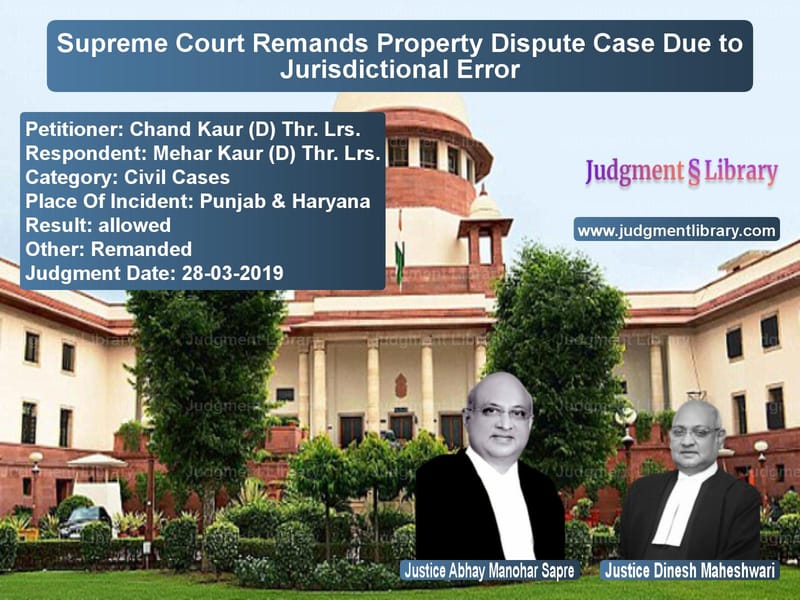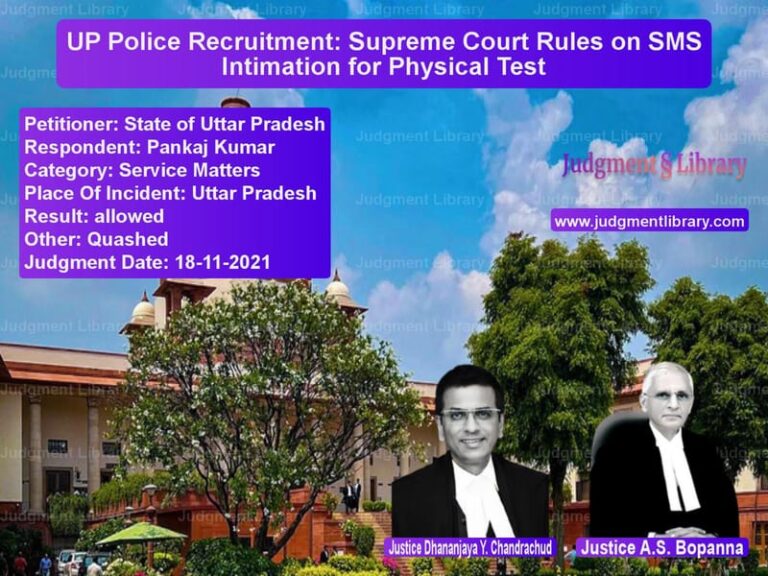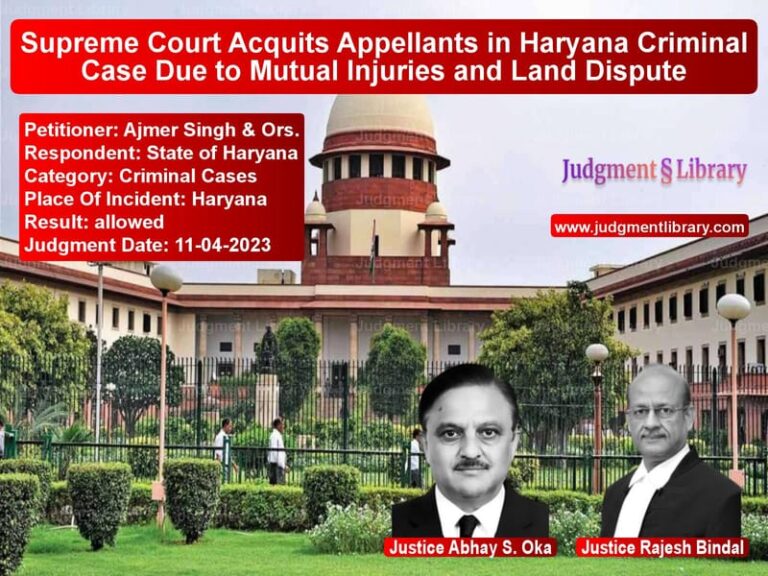Supreme Court Remands Property Dispute Case Due to Jurisdictional Error
The case of Chand Kaur (D) Thr. Lrs. vs. Mehar Kaur (D) Thr. Lrs. revolves around a long-standing property dispute that reached the Supreme Court after the Punjab & Haryana High Court allowed a second appeal without framing substantial questions of law. The Supreme Court ruled that the High Court committed a jurisdictional error and remanded the case for fresh adjudication.
Background of the Case
The dispute concerns the inheritance of property belonging to Jaimal. The appellant, Chand Kaur, claimed entitlement to half of Jaimal’s property based on previous litigation between Mehar Singh and herself. However, the respondents, Mehar Kaur’s legal heirs, contested this claim, arguing that Chand Kaur was neither the daughter of Santo nor was Santo the daughter of Cheta, making her ineligible to inherit.
High Court Decision
The Punjab & Haryana High Court, in its ruling on March 23, 2011, allowed the appeals filed by Mehar Kaur and dismissed those filed by Chand Kaur. The High Court concluded:
- Chand Kaur was not entitled to inherit any portion of Jaimal’s property.
- Mehar Singh and the legal heirs of Mehar Kaur were entitled to the entire property in equal shares.
However, the Supreme Court noted a critical issue: the High Court had failed to frame substantial questions of law as required under Section 100 of the Code of Civil Procedure, 1908 (CPC).
Legal Issues Before the Supreme Court
The key legal question in this case was:
- Whether the High Court had the jurisdiction to allow a second appeal without framing substantial questions of law.
Arguments by the Petitioner (Chand Kaur’s Legal Representatives)
- The High Court violated the mandatory requirement under Section 100 CPC by failing to frame substantial questions of law before adjudicating the second appeal.
- By modifying the findings of the First Appellate Court without framing legal questions, the High Court exceeded its jurisdiction.
- Under settled legal precedents, a second appeal must be decided based on framed substantial questions of law.
Arguments by the Respondent (Mehar Kaur’s Legal Representatives)
- The High Court’s decision was justified as it rectified errors in the First Appellate Court’s judgment.
- Even if questions of law were not explicitly framed, the decision was based on a fair assessment of facts.
- The High Court was correct in holding that Chand Kaur was not legally entitled to Jaimal’s property.
Supreme Court’s Analysis and Judgment
The Supreme Court analyzed the procedural requirements of a second appeal under Section 100 CPC and made the following key observations:
- “The High Court has no jurisdiction to allow a second appeal without framing substantial questions of law.”
- “Framing of substantial questions of law is a sine qua non for the exercise of jurisdiction under Section 100 CPC.”
- “Since the High Court modified the First Appellate Court’s findings without framing such questions, the judgment suffers from a jurisdictional error.”
- “In previous rulings such as Surat Singh (Dead) vs. Siri Bhagwan & Ors. (2018) and Vijay Arjun Bhagat & Ors. vs. Nana Laxman Tapkire & Ors. (2018), this Court held that second appeals must be decided only after framing and answering substantial questions of law.”
Final Judgment
The Supreme Court ruled as follows:
- The High Court’s judgment dated March 23, 2011 was set aside.
- The second appeals were remanded to the High Court for fresh adjudication.
- The High Court was directed to first frame substantial questions of law before proceeding with the appeals.
- The Supreme Court refrained from expressing any opinion on the merits of the dispute.
Significance of the Judgment
This ruling establishes key legal principles regarding second appeals:
1. Mandatory Framing of Substantial Questions of Law
- The Supreme Court reaffirmed that High Courts cannot decide second appeals without first framing substantial questions of law.
- This ensures that second appeals do not turn into a third round of fact-finding, which is beyond the scope of Section 100 CPC.
2. Jurisdictional Boundaries of High Courts
- The ruling prevents High Courts from exceeding their jurisdiction in second appeals.
- Without substantial questions of law, High Courts cannot interfere with First Appellate Court judgments.
3. Protection Against Arbitrary Modifications
- This judgment ensures that High Courts do not arbitrarily modify findings of fact in the absence of legal scrutiny.
- It reinforces the requirement for legal justification before altering lower court decisions.
Conclusion
The Supreme Court’s decision in Chand Kaur vs. Mehar Kaur is a landmark ruling ensuring that second appeals are decided strictly within the legal framework of Section 100 CPC. By remanding the case, the Court reinforced that substantial questions of law are essential for High Court interventions, thereby preserving judicial discipline and preventing unwarranted modifications of lower court rulings.
Petitioner Name: Chand Kaur (D) Thr. Lrs..Respondent Name: Mehar Kaur (D) Thr. Lrs..Judgment By: Justice Abhay Manohar Sapre, Justice Dinesh Maheshwari.Place Of Incident: Punjab & Haryana.Judgment Date: 28-03-2019.
Don’t miss out on the full details! Download the complete judgment in PDF format below and gain valuable insights instantly!
Download Judgment: Chand Kaur (D) Thr. vs Mehar Kaur (D) Thr. Supreme Court of India Judgment Dated 28-03-2019.pdf
Direct Downlaod Judgment: Direct downlaod this Judgment
See all petitions in Property Disputes
See all petitions in Succession and Wills
See all petitions in Landlord-Tenant Disputes
See all petitions in Judgment by Abhay Manohar Sapre
See all petitions in Judgment by Dinesh Maheshwari
See all petitions in allowed
See all petitions in Remanded
See all petitions in supreme court of India judgments March 2019
See all petitions in 2019 judgments
See all posts in Civil Cases Category
See all allowed petitions in Civil Cases Category
See all Dismissed petitions in Civil Cases Category
See all partially allowed petitions in Civil Cases Category







